2015年9月12日PETS 2 真题听力
2015年高考英语全国2卷听力
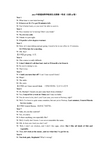
2015年普通高等学校招生全国统一考试(全国II卷)Text 1W: What time is your train leaving?M: It leaves at 10. I’ve got 50 minutes left.W: You’d better hurry, or you won’t be able to catch it.Text 2M: Nice weather we’re having! Don’t you thi nk?W: No, it is too cold.M: I think it is just right.W:I’d prefer a few degrees warmer.Text 3M: Now, let’s stop talking and get going. I need to be in my office in 15 minutes.Or I’ll be late for a meeting.W: OK. Bye!【注释】get going 出发Text 4M: This course is really difficult.W:I don’t think it’s all that bad. And we’ll benefit a lot from it.M: So you’re taking it, too.W: That’s true.Text 5W: Could you turn that off? I can’t hear myself think!M: What?W: The radio.M: Oh, sorry.【注释】can’t hear oneself think (受噪音影响) 无法专心思考Text 6W: Hi, Michael! I heard you just came back from a holiday?M: Yes. I stayed for a week in China and 5 days in India.W: You do travel a lot, don’t you? Last year, you went to Norway, right?M: Well, I’ve been to qui te some countries, but not yet to Norway. Last summer, I toured Russia for two weeks.【注释】I toured Russia. 我参观了俄罗斯。
【精品】2015二级英语听力模拟试题(一)

Text 3 M: He shoots…and he Ahhhhhhh… W: All right, honey. Enough basketball. It’s almost time for dinner. Go upstairs and wash your hands, please. M: Aw, Mom, just five more minutes, OK? 3. What does the woman ask the boy to do? B A. Turn off the TV in five minutes. B. Wash his hands upstairs. C. Sit down for dinner right away. 解析:该题为简单细节题。从女士所说知道答案是B.
9. What did the man suggest the woman do? C A. Try another café . B. Go to the corner market. C. Call Room Service. 解析:该题依然是细节题,从男士问话have you tried Room Service可以看出他的建议。 10. When does the conversation probably take place? A A. Late at night. B. In the middle of the day. C. In the afternoon. 解析:该题是稍有难度的推断题,从女士一开始说要喝 点东西帮她入睡可判断时间可能是晚上,到对话后面男 士说This café is the only place that’s open around here. I’m afraid this part of town closes pretty early.则可以肯定 答案是A.
历年PETS二级听力真题及答案
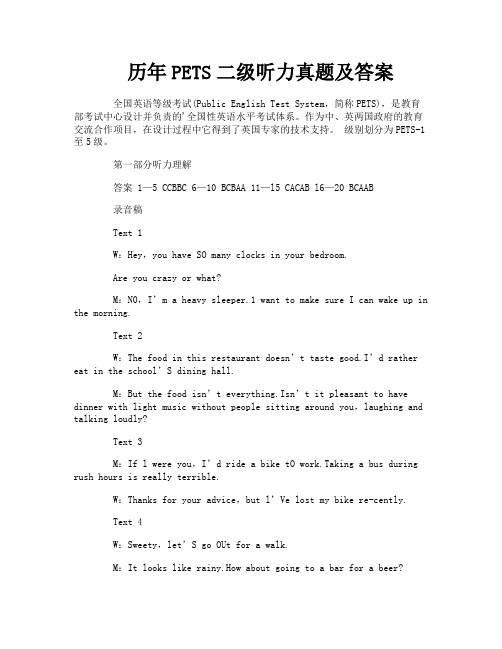
历年PETS二级听力真题及答案全国英语等级考试(Public English Test System,简称PETS),是教育部考试中心设计并负责的'全国性英语水平考试体系。
作为中、英两国政府的教育交流合作项目,在设计过程中它得到了英国专家的技术支持。
级别划分为PETS-1至5级。
第一部分听力理解答案 1—5 CCBBC 6—10 BCBAA 11—l5 CACAB l6—20 BCAAB录音稿Text 1W:Hey,you have SO many clocks in your bedroom.Are you crazy or what?M:N0,I’m a heavy sleeper.1 want to make sure I can wake up in the morning.Text 2W:The food in this restaurant doesn’t taste good.I’d rather eat in the school’S dining hall.M:But the food isn’t everything.Isn’t it pleasant to have dinner with light music without people sitting around you,laughing and talking loudly?Text 3M:If l were you,I’d ride a bike tO work.Taking a bus during rush hours is really terrible.W:Thanks for your advice,but l’Ve lost my bike re-cently.Text 4W:Sweety,let’S go OUt for a walk.M:It looks like rainy.How about going to a bar for a beer?W:But I can’t drink beer with the medicine l’m tak-ing.Why not go to a movie?M:I would rather watch a video online.Text 5W:I’d like tO have my car serviced,the engine and wheels checked.How long will that take?M:Oh,well,it’S rather late.I’m afraid it’11 take hours.You have to have it done in the morning,but we can lend you a car like yours free of charge.You call take it now.Text 6W:What’S going on between you and Charlie?Did you have a fight or something?M:N0,but I can’t stand him anymore.He is the worst roommate l’ve ever had.He never cleans up after himself and he is always listening to loud music when I try to get some sleep.W:Why don’t you have a heart—t0—heart talk with him?M:I’ve tried,but it didn’t work.Maybe you can talk tohim.After all,you are his good friend.Text 7M:Hi,Sue,it’S me.W:Well,hell0,where have you been all day,Steve?Mr.Smith asked me this morning where you were but he didn’t seem to be looking for you or anytl:1ing.M:What did you say?W:I told him that I didn’t know.He seemed very busy as manager always are.Are you OK?M:I’m sorry.I didn’t call you this mornin9.I’ve had a cold since Saturday.I haven’t eaten mtlch these days and it has made me feel really weak.but l’llprobably be there tomorrow.W:All right.We’U go on a business trip next week and don’t worry.You should go to see a doctor,Steve.M:Thanks,but l’Ill getting better now.W:Take care then,bye.M:Bye bye,Sue.Text 8W:0K,tell me about yourself.M:Well,last year in school I played on the football team.It kept me busy。
公共英语等级考试_2015年9月公共英语二级考试真题及答案
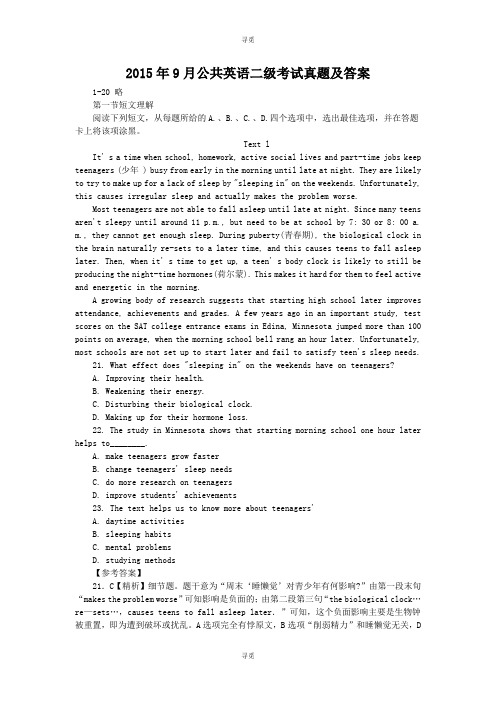
2015年9月公共英语二级考试真题及答案1-20 略第一节短文理解阅读下列短文,从每题所给的A.、B.、C.、D.四个选项中,选出最佳选项,并在答题卡上将该项涂黑。
Text lIt' s a time when school, homework, active social lives and part-time jobs keep teenagers (少年 ) busy from early in the morning until late at night. They are likely to try to make up for a lack of sleep by "sleeping in" on the weekends. Unfortunately, this causes irregular sleep and actually makes the problem worse.Most teenagers are not able to fall asleep until late at night. Since many teens aren't sleepy until around 11 p.m., but need to be at school by 7: 30 or 8: 00 a. m., they cannot get enough sleep. During puberty(青春期), the biological clock in the brain naturally re-sets to a later time, and this causes teens to fall asleep later. Then, when it' s time to get up, a teen' s body clock is likely to still be producing the night-time hormones(荷尔蒙). This makes it hard for them to feel active and energetic in the morning.A growing body of research suggests that starting high school later improves attendance, achievements and grades. A few years ago in an important study, test scores on the SAT college entrance exams in Edina, Minnesota jumped more than 100 points on average, when the morning school bell rang an hour later. Unfortunately, most schools are not set up to start later and fail to satisfy teen's sleep needs.21. What effect does "sleeping in" on the weekends have on teenagers?A. Improving their health.B. Weakening their energy.C. Disturbing their biological clock.D. Making up for their hormone loss.22. The study in Minnesota shows that starting morning school one hour later helps to________.A. make teenagers grow fasterB. change teenagers' sleep needsC. do more research on teenagersD. improve students' achievements23. The text helps us to know more about teenagers'A. daytime activitiesB. sleeping habitsC. mental problemsD. studying methods【参考答案】21.C【精析】细节题。
2015年9月公共英语二级考试真题及答案(阅读)
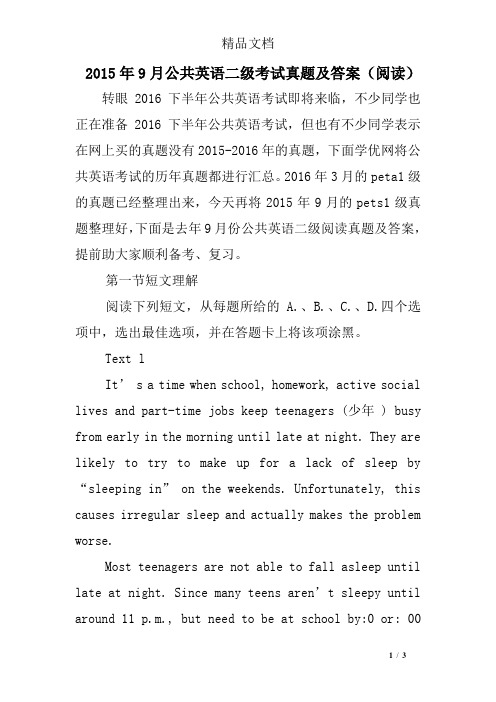
2015年9月公共英语二级考试真题及答案(阅读)转眼2016下半年公共英语考试即将来临,不少同学也正在准备2016下半年公共英语考试,但也有不少同学表示在网上买的真题没有2015-2016年的真题,下面学优网将公共英语考试的历年真题都进行汇总。
2016年3月的peta1级的真题已经整理出来,今天再将2015年9月的pets1级真题整理好,下面是去年9月份公共英语二级阅读真题及答案,提前助大家顺利备考、复习。
第一节短文理解阅读下列短文,从每题所给的 A.、B.、C.、D.四个选项中,选出最佳选项,并在答题卡上将该项涂黑。
Text lIt’ s a time when school, homework, active social lives and part-time jobs keep teenagers (少年 ) busy from early in the morning until late at night. They are likely to try to make up for a lack of sleep by “sleeping in” on the weekends. Unfortunately, this causes irregular sleep and actually makes the problem worse.Most teenagers are not able to fall asleep until late at night. Since many teens aren’t sleepy until around 11 p.m., but need to be at school by:0 or: 00a. m., they cannot get enough sleep. During puberty(青春期), the biological clock in the brain naturally re-sets to a later time, and this causes teens to fall asleep later. Then, when it’ s time to get up, a teen’ s body clock is likely to still be producing the night-time hormones(荷尔蒙). This makes it hard for them to feel active and energetic in the morning.A growing body of research suggests that starting high school later improves attendance, achievements and grades. A few years ago in an important study, test scores on the SAT college entrance exams in Edina, Minnesota jumped more than 100 points on average, when the morning school bell rang an hour later. Unfortunately, most schools are not set up to start later and fail to satisfy teen’s sleep needs.1. What effect does “sleeping in”on the weekends have on teenagers?A. Improving their health.B. Weakening their energy.C. Disturbing their biological clock.D. Making up for their hormone loss.2. The study in Minnesota shows that startingmorning school one hour later helps to________.A. make teenagers grow fasterB. change teenagers’ sleep needsC. do more research on teenagersD. improve students’ achievements3. The text helps us to know more about teenagers’12345免责声明:本文仅代表作者个人观点,与本网无关。
(完整版)2015高考英语全国卷2听力材料

Dialog 7
M: Sally, do you like seafood?
W: Yes, of course.
Dialog 2: M: Nice weather we’re having! Don’t
you think? W: No, it is too cold. M: I think it is just right. W: I’d prefer a few degrees warmer.
Dialog 3
M: Well, it’s Wednesday today. Why don’t you talk to Ms. Jenkins and ask if you can hand it in on Friday morning?
W: Maybe I should try. I guess I just need a good sleep. Thanks, Gorge.
M: If you need any help for the report, just let me know.
Dialog 9
W: Anything interesting in the paper today, dear?
M: Well, yeah. There are a few here that might interest us. Here is one for just four hundred dollars. It only has one bedroom, but it sounds nice, near Lake Street.
全国英语等级考试二级听力真题(及答案)
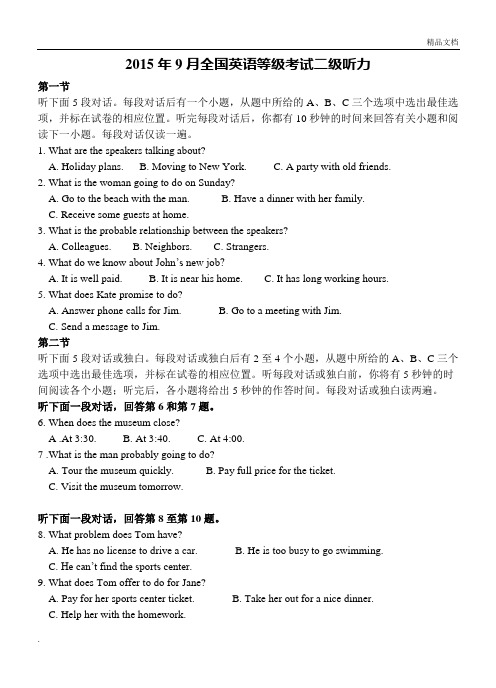
2015年9月全国英语等级考试二级听力第一节听下面5段对话。
每段对话后有一个小题,从题中所给的A、B、C三个选项中选出最佳选项,并标在试卷的相应位置。
听完每段对话后,你都有10秒钟的时间来回答有关小题和阅读下一小题。
每段对话仅读一遍。
1. What are the speakers talking about?A. Holiday plans.B. Moving to New York.C. A party with old friends.2. What is the woman going to do on Sunday?A. Go to the beach with the man.B. Have a dinner with her family.C. Receive some guests at home.3. What is the probable relationship between the speakers?A. Colleagues.B. Neighbors.C. Strangers.4. What do we know a bout John’s new job?A. It is well paid.B. It is near his home.C. It has long working hours.5. What does Kate promise to do?A. Answer phone calls for Jim.B. Go to a meeting with Jim.C. Send a message to Jim.第二节听下面5段对话或独白。
每段对话或独白后有2至4个小题,从题中所给的A、B、C三个选项中选出最佳选项,并标在试卷的相应位置。
听每段对话或独白前,你将有5秒钟的时间阅读各个小题;听完后,各小题将给出5秒钟的作答时间。
每段对话或独白读两遍。
听下面一段对话,回答第6和第7题。
(完整word)2015高考全国卷2英语真题

2015 年普通高等学校招生全国统一考试英语本试卷分第I 卷(选择题)和第H 卷(非选择题)两部分。
考试结束后,将本试卷和答题卡一并交回。
第I 卷注意事项:1. 答第I 卷前,考生务必将自己的姓名、准考证号填写在答题卡上。
2. 选出每小题答案后, 用铅笔把答题卡上对应题目的答案标号涂黑。
如需改动, 用橡皮擦干净后, 再选涂其他答案标 号。
不能答在本试卷上,否则无效。
第一部分 听力(共两节,满分 30 分) 做题时,先将答案标在试卷上。
录音内容结束后,你将有两分钟的时间将试卷上的答案转涂到答题卡 上。
第一节(共 5 小题;每小题 1.5 分,满分 7.5 分)听下面5段对话。
每段对话后有一个小题,从题中所给的A 、BC 三个选项中选出最佳选项,并标在试卷的相应位置。
听完每段对话后,你都有 10 秒钟的时间来回答有关小题和阅读下一小题。
每段对话仅 读一遍。
例: How much is the shirt?5. What does the woman want the man to do A. Speak louder B. Apologize to her.C. Turn off the radio.第二节 (共 1 5小题;每小题 1.5 分,满分 22.5 分) 听下面5段对话或独白。
每段对话或独白后有几个小题,从题中所给的A 、B 、C 三个选项中选出最佳选项,并标在试卷的相应位置。
听每段对话或独白前,你将有时间阅读各个小题,每小题 5秒钟;听完后,各小题将给出 5秒钟的作答时间。
每段对话或独白读两遍。
听第 6 段材料,回答第 6、 7 题。
6. How long did Michael stay in China? A. Five days. B. One week. C.Two weeks. 7. Where did Michael go last year? A. Russia.B. Norway.C. India.A. £ 19.15B. £ 9.18答案是 C 。
(完整word)2015年高考全国卷2英语试题与答案解析,推荐文档
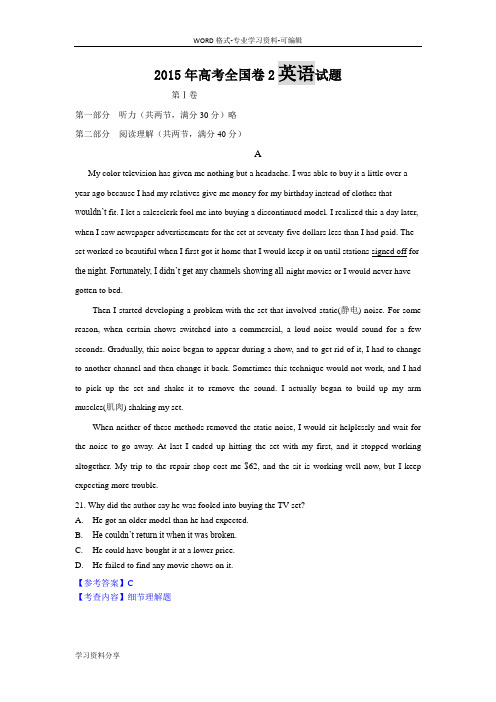
2015年高考全国卷2英语试题第Ⅰ卷第一部分听力(共两节,满分30分)略第二部分阅读理解(共两节,满分40分)AMy color television has given me nothing but a headache. I was able to buy it a little over a year ago because I had my relatives give me money for my birthday instead of clothes that wouldn’t fit. I let a salesclerk fool me into buying a discontinued model. I realized this a day later, when I saw newspaper advertisements for the set at seventy-five dollars less than I had paid. The set worked so beautiful when I first got it home that I would keep it on until stations signed off for the night. Fortunately, I didn’t get any channels showing all-night movies or I would never have gotten to bed.Then I started developing a problem with the set that involved static(静电) noise. For some reason, when certain shows switched into a commercial, a loud noise would sound for a few seconds. Gradually, this noise began to appear during a show, and to get rid of it, I had to change to another channel and then change it back. Sometimes this technique would not work, and I had to pick up the set and shake it to remove the sound. I actually began to build up my arm muscles(肌肉) shaking my set.When neither of these methods removed the static noise, I would sit helplessly and wait for the noise to go away. At last I ended up hitting the set with my first, and it stopped working altogether. My trip to the repair shop cost me $62, and the sit is working well now, but I keep expecting more trouble.21. Why did the author say he was fooled into buying the TV set?A.He got an older model than he had expected.B.He couldn’t return it when it was broken.C.He could have bought it at a lower price.D.He failed to find any movie shows on it.【参考答案】C【考查内容】细节理解题【解析思路】根据第一段第四行“when I saw newspaper advertisements for the set at seventy-five dollars less than I had paid.”当我看到报纸上75美元比我买的价格低的时候,我感觉我上当了。
2015年9月pets2真题及答案(附原文填空)

2.18 2015年9月pets 2 真题(刘兰英老师校对)听下面五段材料,回答第1-5题1. What are the speakers talking about?A. Holiday plansB. Moving to New YorkC. A party with old friends2. What is the woman going to do on Sunday?A. Go to the beach with the manB. Have a dinner with her familyC. Receive some guests at home3. What is the probable relationship between the speakers?A. ColleaguesB. NeighborsC. Strangers4. What do we know about John’s new job?A. It is well paid.B. It is near his home.C. It has long working hours.5. What does Kate promise to do?A. Answer phone calls for Jim.B. Go to a meeting with Jim.C. Send a message to Jim.听下面一段对话,回答第6和第7题。
6. When does the museum close?A. At 3:30.B. At 3:40.C. At 4:00.7. What is the man probably going to do?A. Tour the museum quickly.B. Pay full price for the ticket.C. Visit the museum tomorrow.听下面一段对话,回答第8至第10题。
2015年高考全国II卷英语听力部分
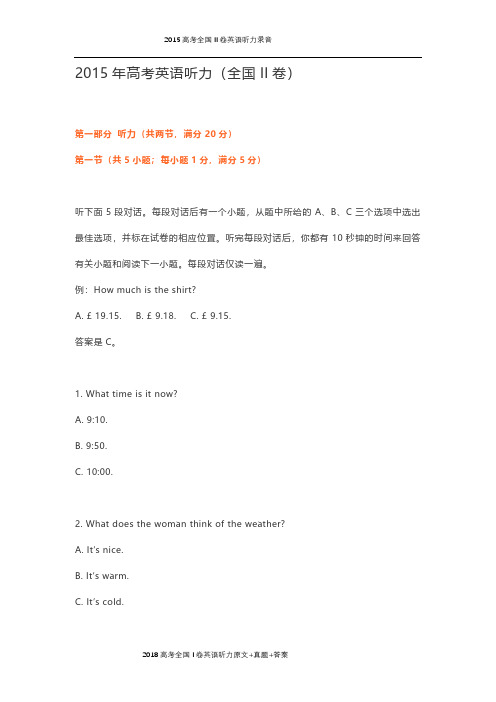
2015年高考英语听力(全国II卷)第一部分听力(共两节,满分20分)第一节(共5小题;每小题1分,满分5分)听下面5段对话。
每段对话后有一个小题,从题中所给的A、B、C三个选项中选出最佳选项,并标在试卷的相应位置。
听完每段对话后,你都有10秒钟的时间来回答有关小题和阅读下一小题。
每段对话仅读一遍。
例:How much is the shirt?A. £ 19.15.B. £ 9.18.C. £ 9.15.答案是C。
1. What time is it now?A. 9:10.B. 9:50.C. 10:00.2. What does the woman think of the weather?A. It’s nice.B. It’s warm.C. It’s cold.3. What will the man do?A. Attend a meeting.B. Give a lecture.C. Leave his office.4. What is the woman’s opinion about the course?A. Too hard.B. Worth taking.C. Very easy.5. What does the woman want the man to do?A. Speak louder.B. Apologize to her.C. Turn off the radio.第二节(共15小题;每小题1分,满分15分)听下面5段对话或独白。
每段对话或独白后有几个小题,从题中所给的A、B、C三个选项中选出最佳选项,并标在试卷的相应位置。
听每段对话或独白前,你将有时间阅读各个小题,每小题5秒钟;听完后,各小题将给出5秒钟的作答时间。
每段对话或独白读两遍。
听第6段材料,回答第6、7题。
6. How long did Michael stay in China?A. Five days.B. One week.C. Two weeks.7. Where did Michael go last year?A. Russia.B. Norway.C. India.听第7段材料,回答第8、9题。
2015年高考全国卷II(新课标)英语听力试题
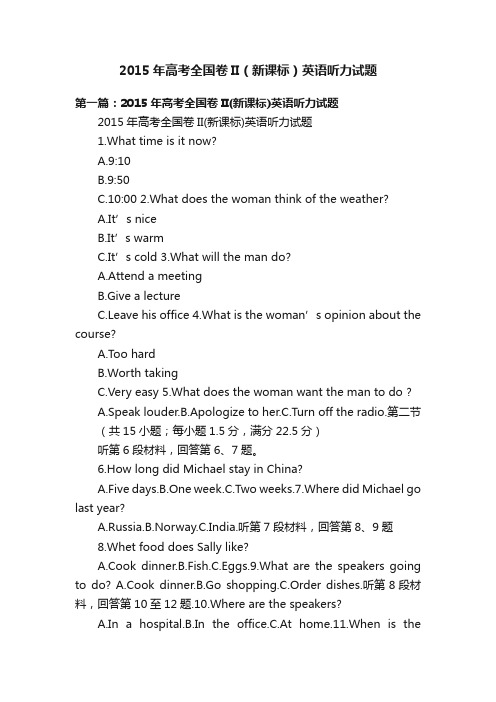
2015年高考全国卷II(新课标)英语听力试题第一篇:2015年高考全国卷II(新课标)英语听力试题2015年高考全国卷II(新课标)英语听力试题1.What time is it now?A.9:10B.9:50C.10:00 2.What does the woman think of the weather?A.It’s niceB.It’s warmC.It’s cold 3.What will the man do?A.Attend a meetingB.Give a lectureC.Leave his office 4.What is the woman’s opinion about the course?A.Too hardB.Worth takingC.Very easy 5.What does the woman want the man to do ?A.Speak louder.B.Apologize to her.C.Turn off the radio.第二节(共15小题;每小题1.5分,满分22.5分)听第6段材料,回答第6、7题。
6.How long did Michael stay in China?A.Five days.B.One week.C.Two weeks.7.Where did Michael go last year?A.Russia.B.Norway.C.India.听第7段材料,回答第8、9题8.Whet food does Sally like?A.Cook dinner.B.Fish.C.Eggs.9.What are the speakers going to do? A.Cook dinner.B.Go shopping.C.Order dishes.听第8段材料,回答第10至12题.10.Where are the speakers?A.In a hospital.B.In the office.C.At home.11.When is thereport due ?A.Thursday.B.Friday.C.Next Monday.12.What does George suggest Stephanie do with the report?A.Improve it.B.Hand it in later.C.Leave it with him.听第9段材料,回答第13至16题。
2015年考研英语二真题及答案(word打印版).doc
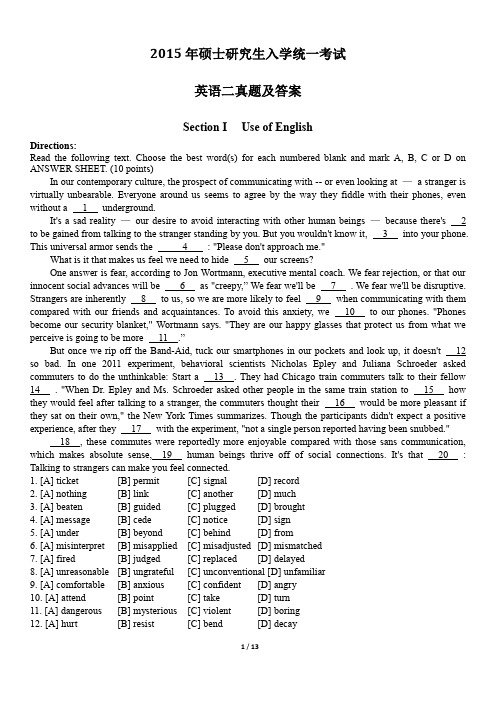
2015年硕士研究生入学统一考试英语二真题及答案Section I Use of EnglishDirections:Read the following text. Choose the best word(s) for each numbered blank and mark A, B, C or D on ANSWER SHEET. (10 points)In our contemporary culture, the prospect of communicating with -- or even looking at —a stranger is virtually unbearable. Everyone around us seems to agree by the way they fiddle with their phones, even without a 1 underground.It's a sad reality —our desire to avoid interacting with other human beings —because there's 2 to be gained from talking to the stranger standing by you. But you wouldn't know it, 3 into your phone. This universal armor sends the 4 : "Please don't approach me."What is it that makes us feel we need to hide 5 our screens?One answer is fear, according to Jon Wortmann, executive mental coach. We fear rejection, or that our innocent social advances will be 6 as "creepy,” We fear we'll be 7 . We fear we'll be disruptive. Strangers are inherently 8 to us, so we are more likely to feel 9 when communicating with them compared with our friends and acquaintances. To avoid this anxiety, we 10 to our phones. "Phones become our security blanket," Wortmann says. "They are our happy glasses that protect us from what we perceive is going to be more 11 .”But once we rip off the Band-Aid, tuck our smartphones in our pockets and look up, it doesn't 12 so bad. In one 2011 experiment, behavioral scientists Nicholas Epley and Juliana Schroeder asked commuters to do the unthinkable: Start a 13 . They had Chicago train commuters talk to their fellow 14 . "When Dr. Epley and Ms. Schroeder asked other people in the same train station to 15 how they would feel after talking to a stranger, the commuters thought their 16 would be more pleasant if they sat on their own," the New York Times summarizes. Though the participants didn't expect a positive experience, after they 17 with the experiment, "not a single person reported having been snubbed."18 , these commutes were reportedly more enjoyable compared with those sans communication, which makes absolute sense, 19 human beings thrive off of social connections. It's that 20 : Talking to strangers can make you feel connected.1. [A] ticket [B] permit [C] signal [D] record2. [A] nothing [B] link [C] another [D] much3. [A] beaten [B] guided [C] plugged [D] brought4. [A] message [B] cede [C] notice [D] sign5. [A] under [B] beyond [C] behind [D] from6. [A] misinterpret [B] misapplied [C] misadjusted [D] mismatched7. [A] fired [B] judged [C] replaced [D] delayed8. [A] unreasonable [B] ungrateful [C] unconventional [D] unfamiliar9. [A] comfortable [B] anxious [C] confident [D] angry10. [A] attend [B] point [C] take [D] turn11. [A] dangerous [B] mysterious [C] violent [D] boring12. [A] hurt [B] resist [C] bend [D] decay13. [A] lecture [B] conversation [C] debate [D] negotiation14. [A] trainees [B] employees [C] researchers [D] passengers15. [A] reveal [B] choose [C] predict [D] design16. [A] voyage [B] flight [C] walk [D] ride17. [A] went through [B] did away [C] caught up [D] put up18. [A] In turn [B] In particular [C] In fact [D] In consequence19. [A] unless [B] since [C] if [D] whereas20. [A] funny [B] simple [C] logical [D] rareSection II Reading ComprehensionPart ADirections:Read the following four texts. Answer the questions below each text by choosing A, B, C or D. Mark your answers on ANSWER SHEET. (40 points)Text 1A new study suggests that contrary to most surveys, people are actually more stressed at home than at work. Researchers measured people’s cortisol, which is a stress marker, while they were at work and while they were at home and found it higher at what is supposed to be a place of refuge.“Further contradicting conventional wisdom, we found that women as well as men have lower levels of stress at work than at home, ”writes one of the researchers, Sarah Damske. In fact women even say they feel better at work, she notes.“ It is men, not women, who report being happier at home than at work. ”Another surprise is that findings hold true for both those with children and without, but more so for nonparents. This is why people who work outside the home have better health.What the study doesn’t measure is whether people are still doing work when they’re at home, whether it is household work or work brought home from the office. For many men, the end of the workday is a time to kick back. For women who stay home, they never get to leave the office. And for women who work outside the home, they often are playing catch-up-with-household tasks. With the blurring of roles, and the fact that the home front lags well behind the workplace a making adjustments for working women, it’s not surprising that women are more stressed at home.But it’s not just a gender thing. At work, people pretty much know what t hey’re supposed to be doing: working, marking money, doing the tasks they have to do in order to draw an income. The bargain is very pure: Employee puts in hours of physical or mental labor and employee draws out life-sustaining moola.On the home front, however, people have no such clarity. Rare is the household in which the division of labor is so clinically and methodically laid out. There are a lot of tasks to be done, there are inadequate rewards for most of them. Your home colleagues-your family-have no clear rewards for their labor; they need to be talked into it, or if they’re teenagers, threatened with complete removal of all electronic devices. Plus, they’re your family. You cannot fire your family. You never really get to go home from home.So it’s not surprising that people are more stressed at home. Not only are the tasks apparently infinite, the co-workers are much harder to motivate.21. According to Paragraph 1, most previous surveys found that home_____[A] offered greater relaxation than the workplace[B] was an ideal place for stress measurement[C] generated more stress than the workplace[D] was an unrealistic place for relaxation22. According to Damaske, who are likely to be the happiest at home?[A] Childless wives [B] Working mothers[C] Childless husbands [D] Working fathers23.The blurring of working women's roles refers to the fact that_____[A] it is difficult for them to leave their office[B] their home is also a place for kicking back[C] there is often much housework left behind[D] they are both bread winners and housewives24.The word“moola”(Line4,Para4)most probably means_____[A] skills [B] energy [C] earnings [D] nutrition25.The home front differs from the workplace in that_____[A] division of labor at home is seldom clear-cut[B] home is hardly a cozier working environment[C] household tasks are generally more motivating[D] family labor is often adequately rewardedText 2For years, studies have found that first-generation college students- those who do not have a parent with a college degree- lag other students on a range of education achievement factors. Their grades are lower and their dropout rates are higher. But since such students are most likely to advance economically if they succeed in higher education, colleges and universities have pushed for decades to recruit more of them. This has created “a paradox” in that recruiting first- generation students, but then watching many of them fail, means that higher education has “continued to reproduce and widen, rather than close” ab achievement gap based on social class, according to the depressing beginning of a paper forthcoming in the journal Psychological Science.But the article is actually quite optimistic, as it outlines a potential solution to this problem, suggesting that an approach (which involves a one-hour, next-to-no-cost program) can close 63 percent of the achievement gap (measured by such factors as grades) between first-generation and other students.The authors of the paper are from different universities, and their findings are based on a study involving 147 students ( who completed the project) at an unnamed private university. First generation was defined as not having a parent with a four-year college degree. Most of the first-generation students(59.1 percent) were recipients of Pell Grants, a federal grant for undergraduates with financial need, while this was true only for 8.6 percent of the students wit at least one parent with a four-year degree.Their thesis- that a relatively modest intervention could have a big impact- was based on the view that first-generation students may be most lacking not in potential but in practical knowledge about how to deal with the issues that face most college students. They cite past research by several authors to show that this is the gap that must be narrowed to close the achievement gap.Many first- generation students “struggle to navigate the middle-class culture of higher education, learn the ‘rules of the game,’ and take advantage of college resources,” they write. And this becomes more of a problem when collages don’t talk about the class advantage and disadvantages of different groups of students. Because US colleges and universities seldom acknowledge how social class can affect students ’educational experience, many first-generation students lack sight about why they are struggling and do not understand how students’ like them can improve.26. Recruiting more first- generation students has_______[A] reduced their dropout rates [B] narrowed the achievement gap[C] missed its original purpose [D] depressed college students27. The author of the research article are optimistic because_______[A] the problem is solvable [B] their approach is costless[C] the recruiting rate has increased [D] their finding appeal to students28. The study suggests that most first- generation students______[A] study at private universities [B] are from single-parent families[C] are in need of financial support [D] have failed their collage29. The author of the paper believe that first-generation students_______[A] are actually indifferent to the achievement gap[B] can have a potential influence on other students[C] may lack opportunities to apply for research projects[D] are inexperienced in handling their issues at college30. We may infer from the last paragraph that_______[A] universities often reject the culture of the middle-class[B] students are usually to blame for their lack of resources[C] social class greatly helps enrich educational experiences[D]colleges are partly responsible for the problem in questionText 3Even in traditional offices, “the lingua franca of corporate America has gotten much more emotional and much more right-brained than it was 20 years ago,” said Harvard Business School professor Nancy Koehn. She started spinning off examples. “If you and I parachuted back to Fortune 500 companies in 1990, we would see much less frequent use of terms like journey, mission, passion. There were goals, there were strategies, there were objectives, but we didn’t talk about energy; we didn’t talk about passion.”Koehn pointed out that this new era of cor porate vocabulary is very “team”-oriented—and not by coincidence.“Let’s not forget sports—in male-dominated corporate America, it’s still a big deal. It’s not explicitly conscious; it’s the idea that I’m a coach, and you’re my team, and we’re in this toget her. There are lots and lots of CEOs in very different companies, but most think of themselves as coaches and this is their team and they want to win.”These terms are also intended to infuse work with meaning—and, as Khurana points out, increase allegianc e to the firm. “You have the importation of terminology that historically used to be associated with non-profit organizations and religious organizations: Terms like vision, values, passion, and purpose,” said Khurana.This new focus on personal fulfillment can help keep employees motivated amid increasingly loud debates over work-life balance. The “mommy wars” of the 1990s are still going on today, prompting arguments about why women still can’t have it all and books like Sheryl Sandberg’s Lean In, whose t itle has become a buzzword in its own right. Terms like unplug, offline, life-hack, bandwidth, and capacity are all about setting boundaries between the office and the home. But if your work is your “passion,” you’ll be more likely to devote yourself to it, even if that means going home for dinner and then working long after the kids are in bed.But this seems to be the irony of office speak: Everyone makes fun of it, but managers love it, companies depend on it, and regular people willingly absorb it. As N unberg said, “You can get people to think it’s nonsense at the same time that you buy into it.” In a workplace that’s fundamentally indifferent to your life and its meaning, office speak can help you figure out how you relate to your work—and how your work defines who you are.31. According to Nancy Koehn, office language has become_____[A] more emotional [B] more objective [C] less energetic [D] less strategic32. “Team”-oriented corporate vocabulary is closely related to_______[A] historical incidents [B] gender difference [C] sports culture [D] athletic executives33. Khurana believes that the importation of terminology aims to______[A] revive historical terms [B] promote company image[C] foster corporate cooperation [D] strengthen employee loyalty34. It can be inferred that Lean In________[A] voices for working women [B] appeals to passionate workaholics[C] triggers debates among mommies [D] praises motivated employees35. Which of the following statements is true about office speak?[A] Managers admire it but avoid it [B] Linguists believe it to be nonsense[C] Companies find it to be fundamental [D] Regular people mock it but accept itText 4Many people talked of the 288,000 new jobs the Labor Department reported for June, along with the drop in the unemployment rate to 6.1 percent, as good news. And they were right. For now it appears the economy is creating jobs at a decent pace. We still have a long way to go to get back to full employment, but at least we are now finally moving forward at a faster pace.However, there is another important part of the jobs picture that was largely overlooked. There was a big jump in the number of people who repot voluntarily working part-time. This figure is now 830,000(4.4 percent) above its year ago level.Before explaining the connection to the Obamacare, it is worth making an important distinction. Many people who work part-time jobs actually want full-time jobs. They take part-time work because this is all they can get. An increase in involuntary part-time work is evidence of weakness in the labor market and it means that many people will be having a very hard time making ends meet.There was an increase in involuntary part-time in June, but the general direction has been down. Involuntary part-time employment is still far higher than before the recession,but it is down by 640,000(7.9percent)from is year ago level.We know the difference between voluntary and involuntary part-time employment because people tell us. The survey used by the Labor Department asks people is they worked less than 35 hours in the reference week. If the answer is“yes”,they are classified as worked less than 35hours in that week because they wanted to work less than full time or because they had no choice .They are only classified as voluntary part-time workers if they tell the survey taker they chose to work less than 35 hours a week.The issue of voluntary part-time relates to Obamacare because one of the main purposes was to allow people to get insurance outside of employment. For many people ,especially those with serious health conditions or family members with serious health conditions ,before Obamacare the only way to get insurance was through a job that provided health insurance.However, Obamacare has allowed more than 12 million people to either get insurance through Medicaid or the exchanges. These are people who may previously have felt the need to get a full-time job that provided insurance in order to cover themselves and their families. With Obamacare there is no longer a link between employment and insurance.36. Which part of the jobs picture are neglected?[A] The prospect of a thriving job market.[B] The increase of voluntary part-time market.[C] The possibility of full employment.[D] The acceleration of job creation.37. Many people work part-time because they_____.[A] prefer part-time jobs to full-time jobs.[B] feel that is enough to make ends meet.[C] cannot get their hands on full-time jobs.[D] haven’t seen the weakness of the market.38. Involuntary part-time employment is the US_____.[A] is harder to acquire than one year ago.[B] shows a general tendency of decline.[C] satisfies the real need of the jobless.[D] is lower than before the recession.39. It can be learned that with Obamacare,_____.[A] it is no longer easy for part-timers to get insurance[B] employment is no longer a precondition to get insurance[C] it is still challenging to get insurance for family members[D] full-time employment is still essential for insurance40. The text mainly discusses_______.[A] employment in the US [B] part-timer classification[C] insurance though Medicaid [D] Obamacare’s troublePart BDirections:In the following text, some sentences have been removed. For Questions 41-45, choose the most suitable one from the list [A]-[G] to fit into each of the numbered blank. There are two extra choices, which do not fit in any of the gaps. Mark your answers on ANSWER SHEET. (10 points)[A] You are not alone[B] Don’t fear responsibility for your life[C] Pave your own unique path[D] Most of your fears are unreal[E] Think about the present moment[F] Experience helps you grow[G] There are many things to be grateful forUnfortunately, life is not a bed of roses. We are going through life facing sad experiences. Moreover, we are grieving various kinds of loss: a friendship, a romantic relationship or a house. Hard times may hold you down at what usually seems like the most inopportune time, but you should remember that they won’t last forever.When our time of mourning is over, we press forward, stronger with a greater understanding and respect for life. Furthermore, these losses make us mature and eventually move us toward future opportunities for growth and happiness. I want to share these ten old truths I’ve learned along the way.41._____________________________Fear is both useful and harmful. This normal human reaction is used to protect us by signaling danger and preparing us to deal with it. Unfortunately, people create inner barriers with a help of exaggerating fears. My favorite actor Will Smith once said, “Fear is no t real. It is a product of thoughts you create. Do not misunderstand me. Danger is very real. But fear is a choice.” I do completely agree that fears are just the product of our luxuriant imagination.42_____________________________If you are surrounded by problems and cannot stop thinking about the past, try to focus on the present moment. Many of us are weighed down by the past or anxious about the future. You may feel guilt over your past, but you are poisoning the present with the things and circumstances you cannot change. Value the present moment and remember how fortunate you are to be alive. Enjoy the beauty of the world around and keep the eyes open to see the possibilities before you. Happiness is not a point of future and not a momentfrom the past, but a mindset that can be designed into the present.43______________________________Sometimes it is easy to feel bad because you are going through tough times. You can be easily caught up by life problems that you forget to pause and appreciate the things you have. Only strong people prefer to smile and value their life instead of crying and complaining about something.44________________________________No matter how isolated you might feel and how serious the situation is, you should always remember that you are not alone. Try to keep in mind that almost everyone respects and wants to help you if you are trying to make a good change in your life, especially your dearest and nearest people. You may have a circle of friends who provide constant good humor, help and companionship. If you have no friends or relatives, try to participate in several online communities, full of people who are always willing to share advice and encouragement.45________________________________Today many people find it difficult to trust their own opinion and seek balance by gaining objectivity from external sources. This way you devalue your opinion and show that you are incapable of managing your own life. When you are struggling to achieve something important you should believe in yourself and be sure that your decision is the best. You live in your skin, think your own thoughts, have your own values and make your own choices.Section III TranslationDirections:Translate the following text from English into Chinese. Write your translation on ANSWER SHEET 2. (15 points)Think about driving a route that’s very familiar. It could be your commute to work, a trip into town or the way home. Whichever it is, you know every twist and turn like the back of your hand. On these sorts of trips it’s easy to zone out from the actual driving and pay little attention to the passing scenery. The consequence is that you perceive that the trip has taken less time than it actually has.This is the well-travelled road effect: people tend to underestimate the time it takes to travel a familiar route.The effect is caused by the way we allocate our attention. When we travel down a well-known route, because we don’t have to concentrate much, time seems to flow more quickly. And afterwards, whe n we come to think back on it, we can’t remember the journey well because we didn’t pay much attention to it. So we assume it was shorter.想想在一条你非常熟悉的路线上开车是什么感觉。
2015年全国卷听力试题+录音稿+答案(1) (1)
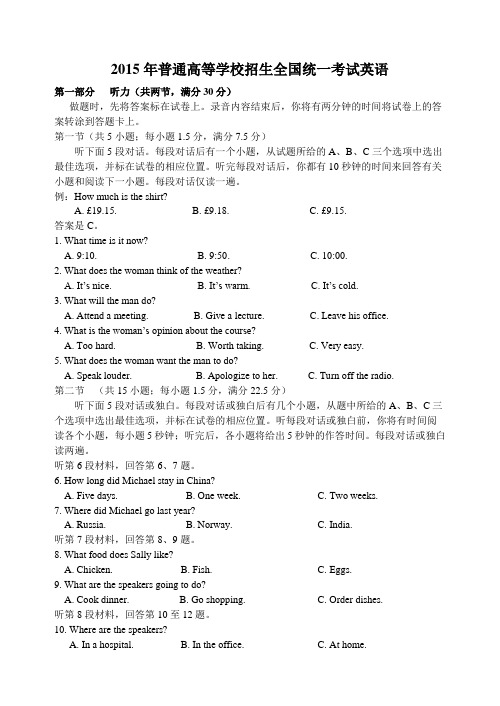
2015年普通高等学校招生全国统一考试英语第一部分听力(共两节,满分30分)做题时,先将答案标在试卷上。
录音内容结束后,你将有两分钟的时间将试卷上的答案转涂到答题卡上。
第一节(共5小题;每小题1.5分,满分7.5分)听下面5段对话。
每段对话后有一个小题,从试题所给的A、B、C三个选项中选出最佳选项,并标在试卷的相应位置。
听完每段对话后,你都有10秒钟的时间来回答有关小题和阅读下一小题。
每段对话仅读一遍。
例:How much is the shirt?A. £19.15.B. £9.18.C. £9.15.答案是C。
1. What time is it now?A. 9:10.B. 9:50.C. 10:00.2. What does the woman think of the weather?A. It’s nice.B. It’s warm.C. It’s cold.3. What will the man do?A. Attend a meeting.B. Give a lecture.C. Leave his office.4. What is the woman’s opinion about the course?A. Too hard.B. Worth taking.C. Very easy.5. What does the woman want the man to do?A. Speak louder.B. Apologize to her.C. Turn off the radio.第二节(共15小题;每小题1.5分,满分22.5分)听下面5段对话或独白。
每段对话或独白后有几个小题,从题中所给的A、B、C三个选项中选出最佳选项,并标在试卷的相应位置。
听每段对话或独白前,你将有时间阅读各个小题,每小题5秒钟;听完后,各小题将给出5秒钟的作答时间。
每段对话或独白读两遍。
2015年高考英语听力试题(新课标II) Word版含答案
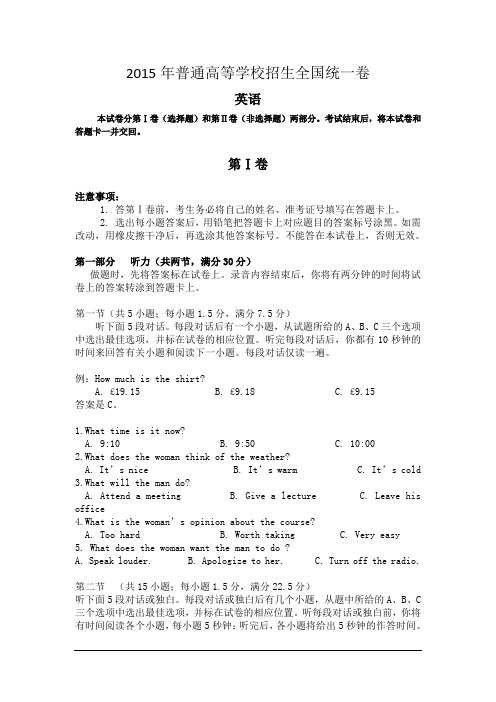
2015年普通高等学校招生全国统一卷英语本试卷分第Ⅰ卷(选择题)和第Ⅱ卷(非选择题)两部分。
考试结束后,将本试卷和答题卡一并交回。
第Ⅰ卷注意事项:1. 答第Ⅰ卷前,考生务必将自己的姓名、准考证号填写在答题卡上。
2. 选出每小题答案后,用铅笔把答题卡上对应题目的答案标号涂黑。
如需改动,用橡皮擦干净后,再选涂其他答案标号。
不能答在本试卷上,否则无效。
第一部分听力(共两节,满分30分)做题时,先将答案标在试卷上。
录音内容结束后,你将有两分钟的时间将试卷上的答案转涂到答题卡上。
第一节(共5小题;每小题1.5分,满分7.5分)听下面5段对话。
每段对话后有一个小题,从试题所给的A、B、C三个选项中选出最佳选项,并标在试卷的相应位置。
听完每段对话后,你都有10秒钟的时间来回答有关小题和阅读下一小题。
每段对话仅读一遍。
例:How much is the shirt?A. £19.15B. £9.18C. £9.15答案是C。
1.What time is it now?A. 9:10B. 9:50C. 10:002.What does the woman think of the weather?A. It’s niceB. It’s warmC. It’s cold3.What will the man do?A. Attend a meetingB. Give a lectureC. Leave his office4.What is the woman’s opinion about the course?A. Too hardB. Worth takingC. Very easy5. What does the woman want the man to do ?A. Speak louder.B. Apologize to her.C. Turn off the radio.第二节(共15小题;每小题1.5分,满分22.5分)听下面5段对话或独白。
历年PETS二级听力真题及答案

历年PETS二级听力真题及答案历年PETS二级听力真题及答案全国英语等级考试(Public English Test System,简称PETS),是教育部考试中心设计并负责的.全国性英语水平考试体系。
作为中、英两国政府的教育交流合作项目,在设计过程中它得到了英国专家的技术支持。
级别划分为PETS-1至5级。
第一部分听力理解答案 1—5 CCBBC 6—10 BCBAA 11—l5 CACAB l6—20 BCAAB 录音稿Text 1W:Hey,you have SO many clocks in your bedroom.Are you crazy or what?M:N0,I’m a heavy sleeper.1 want to make sure I can wake up in the morning.Text 2W:The food in this restaurant doesn’t taste good.I’d rather eat in the school’S dining hall.M:But the food isn’t everything.Isn’t it pleasant to have dinner with light music without people sitting around you,laughing and talking loudly?Text 3M:If l were you,I’d ride a bike tO work.Taking a bus during rush hours is really terrible.W:Thanks for your advice,but l’Ve lost my bike re-cently.Text 4W:Sweety,let’S go OUt for a walk.M:It looks like rainy.How about going to a bar for a beer?W:But I can’t drink beer with the medicine l’m tak-ing.Why not go to a movie?M:I would rather watch a video online.Text 5W:I’d like tO have my car serviced,the engine and wheels checked.How long will that take?M:Oh,well,it’S rather late.I’m afraid it’11 take hours.You have to have it done in the morning,but we can lend you a car like yours free of charge.You call take it now.Text 6W:What’S going on between you and Charlie?Did you have a fight or something?M:N0,but I can’t stand him anymore.He is the worst roommate l’ve ever had.He never cleans up after himself and he is always listening to loud music when I try to get some sleep.W:Why don’t you have a heart—t0—heart talk with him?M:I’ve tried,but it didn’t work.Maybe you can talk to him.After all,you are his good friend.Text 7M:Hi,Sue,it’S me.W:Well,hell0,where have you been all day,Steve?Mr.Smith asked me this morning where you were but he didn’t seem to be looking for you or anytl:1ing.M:What did you say?W:I told him that I didn’t know.He seemed very busy as manager always are.Are you OK?M:I’m sorry.I didn’t call you this mornin9.I’ve had a cold since Saturday.I haven’t eaten mtlch these days and it has made me feel really weak.but l’llprobably be there tomorrow.W:All right.We’U go on a business trip next week and don’t worry.You should go to see a docto r,Steve.M:Thanks,but l’Ill getting better now.W:Take care then,bye.M:Bye bye,Sue.Text 8W:0K,tell me about yourself.M:Well,last year in school I played on the football team.It kept me busy。
2015年普通高等学校招生全国统一考试(课标全国卷II) 英语听力试题

2015年普通高等学校招生全国统一考试(课标全国卷II)第一部分听力(共两节,满分30分)第一节(共5小题;每小题1.5分,满分7.5分)听下面5段对话。
每段对话后有一个小题,从题中所给的A、B、C三个选项中选出最佳选项,并标在试卷的相应位置。
听完每段对话后,你都有10秒钟的时间来回答有关小题和阅读下一小题。
每段对话仅读一遍。
例:How much is the shirt?A. £ 19.15.B. £ 9.18.C. £ 9.15.答案是C。
1. What time is it now?A. 9:10.B. 9:50.C. 10:00.2. What does the woman think of the weather?A. It’s nice.B. It’s warm.C. It’s cold.3. What will the man do?A. Attend a meeting.B. Give a lecture.C. Leave his office.4. What is the woman’s opinion about the course?A. Too hard.B. Worth taking.C. Very easy.5. What does the woman want the man to do?A. Speak louder.B. Apologize to her.C. Turn off the radio.第二节(共15小题;每小题1.5分,满分22.5分)听下面5段对话或独白。
每段对话或独白后有几个小题,从题中所给的A、B、C三个选项中选出最佳选项,并标在试卷的相应位置。
听每段对话或独白前,你将有时间阅读各个小题,每小题5秒钟;听完后,各小题将给出5秒钟的作答时间。
每段对话或独白读两遍。
听第6段材料,回答第6、7题。
6. How long did Michael stay in China?A. Five days.B. One week.C. Two weeks.7. Where did Michael go last year?A. Russia.B. Norway.C. India.听第7段材料,回答第8、9题。
- 1、下载文档前请自行甄别文档内容的完整性,平台不提供额外的编辑、内容补充、找答案等附加服务。
- 2、"仅部分预览"的文档,不可在线预览部分如存在完整性等问题,可反馈申请退款(可完整预览的文档不适用该条件!)。
- 3、如文档侵犯您的权益,请联系客服反馈,我们会尽快为您处理(人工客服工作时间:9:00-18:30)。
2015年9月全国英语等级考试(第二级)第一节1. What are the speakers talking about?A. Holiday plans.B. Moving to New York.C. A party with old friends.2. What is the woman going to do on Sunday?A. Go to the beach with the man.B. Have a dinner with her family.C. Receive some guests at home.3. What is the probable relationship between the speakers?A. Colleagues.B. Neighbors.C. Strangers.4. What do we know about John’s new job?A. It is well paid.B. It is near his home.C. It has long working hours.5. What does Kate promise to do?A . Answer phone calls for Jim. B. Go to a meeting with Jim. C. Send a message to Jim.第二节听下面一段对话,回答第6和第7题。
6. When does the museum close?A. At 3: 30.B. At 3: 40.C. At 4: 00.7. What is the man probably going to do?A. Tour the museum quickly.B. Pay full price for the ticket.C. Visit the museum tomorrow.听下面一段对话,回答第8至第10题。
8. What problem does Tom have?A. He has no license to drive a car.B. He is too busy to go swimming.C. He can’t find the sports center.9. What does Tom offer to do for Jane?A. Pay for her sports center ticket.B. Take her out for a nice dinner.C. Help her with the homework.10. What is Jane worried about?A. Her book report.B. The mid-term exam.C. Tom’s weekend plan.听下面一段对话,回答第11和第12题。
11. Where does the conversation probably take place?A. In a ticket office.B. In a department store.C. In an information centre.12. What will the man probably do?A. Tour the city.B. Visit an island.C. Buy a booklet.听下面一段对话,回答第13至第16题。
13. How many languages has Dr. Green’s new book been trans lated into?A. 5.B. 13.C. 30.14. Where did the Slow Food Movement begin?A . In Italy. B. In France. C. In Germany.15. What did the study in Britain find out?A. More children make friends on the Internet.B. More children think friendship is important.C. More children say they have no best friend.16. What is the main idea Dr. Green tries to express in the talk?A. To be slow means to focus on quality.B. Friendship should be developed slowly.C. The British support the Slow Movement.听下面一段独白,回答第17至第20题。
17. Where does the speaker come from?A. Canada.B. England.C. Thailand.18. How does the speaker view the English lessons here in schools?A. They are not special.B. They are not enough.C. They are not interesting.19. In what way are the speaker’s English programs different?A. They are designed in various styles.B. They are broadcast live every day.C. They are based on the computer.20. What does the speaker expect people to do?A. Attend their English classes.B. Practice their English every day.C. Watch English movies and TV shows.2015年9月全国英语等级考试(第二级)录音原文Text 1M: Are you going anywhere for Christmas?W: I thought about going to my sister's in New York. How about you?M: I'll probably just stay at home.Text 2M: I'm going to the beach this Sunday. Would you like to come?W: Oh, Sunday's a bit of a problem. Some of my friends are coming for a dinner at my place. What about Saturday?Text 3W: Mr. Baker, could I possibly use your phone? Ours doesn’t work. Judy is ill, and I want to call a doctor.M: Sure. Come on in. Hope ever ything’s well with Judy.Text 4W: Congratulations, John! I heard about your new job.M: Thanks. It's nearly perfect for me. The working hours are convenient, and it's an easy walk from home. If only the pay were half as good as everything else!Text 5M: Kate, I'm going to a meeting tomorrow. Would you please help take my phone calls?W: No problem, Jim. I'll take a message if anyone calls.Text 6M: Excuse me. One ticket, please. Do you give students a discount?W: We do, but the museum will close in twenty minutes. We stop selling tickets at 3: 30. It's 3: 40 now.M: Could you possibly let me go in for a quick look? I can pay the full price.W: I’m sorry, I can't. And it's not really worth it because you won't be able to see everything within twenty minutes.You can come back tomorrow morning. The museum opens at nine o'clock.M: Well, in that case, I’ll do what you say.Text 7W: Hi, Tom. How are you?M: Hi, Jane. I'm fine. Listen, I plan to go swimming in the sports center this weekend. But it's a long way, and I haven't got my driver’s license yet. How about us going together in your car? I'll buy the tickets.W: Well, it's great, but I’ve got homework to do.M: Come on! It doesn’t matter that you go out for one afternoon.W: Oh, I really can't. Although I finished my book report, the upcoming mid-term exam really makes me nervous. I don’t think I’d enjoy an outing now. Sorry I can’t drive you.M: Oh, don’t worry. I can find someone else. Good luck with your exam!W: Thanks. See you!M: Bye!Text 8M: Hello. I'd like this guidebook, please. How much is it?W: All things are free here.M: Oh, thanks. I'll stay in the city for one week. Could you tell me what places I should visit?W: Well, there are a lot. Are you interested in islands, such as Lantau?M: Islands?W: Yes. There are a lot of interesting things you can see — old villages and churches. And the scenery is beautiful.Take this booklet. It tells you more.M: Thank you very much. That’s a great suggestion.W: You are welcome.Text 9W: Dr. Green, congratulations on the success of your new book! We learned that it has been translated into 30 languages — English, of course, French, German, Japanese, Chinese, and so on.M: Thanks, Helen.W: Well, could you tell us what this popular book is about?M: It’s called In Praise of Slow. It's about how the world got stuck in fast-forward, and how more and more people everywhere are slowing down. In other words, it’s about the rise of the Slow Movement.W: What is the Slow Movement?M: It is a revolution against the idea that faster is always better. When I say “slow”, I don’t mean doing everything slowly. It’s about doing everything as well as possible, instead of as fast as possible. It’s about quality in everything we do.W: When and where was this “slow” idea born?M: It was born in the early 1990s in Italy. It began as the Slow Food Movement, which centered on food. More recently, “slow” has become popular worldwide.W: Have we reached the point of trying to speed up something that cannot really be sped up?M: Of course. The Internet connects us in wonderful ways, but it also leads us into trying to hurry up relationships.So you find people online saying they have more than 4,000 friends. The very idea of friendship is not considered important. And we may be losing the ability to make friends. In Britain, a study found that in the past ten years, the number of children who say they have no best friend rose from under one in eight to nearly one in five!Text 10Good morning, everyone. I'm pleased to be here to give a talk. We’re two brothers from Canada, and we’ve been living in Thailand for eight years. We noticed that most English lessons here in schools focus only on reading and writing, so a lot of people can’t understand and speak well in English. And we’d like to do something about it. Our idea is simple: we want to teach people how to understand and speak English like a native speaker. Different from broadcast English programs, we design special fun English programs based on the computer and use them to teach words and expressions we use in real life. We talk in a casual style on a number of interesting topics, and we share personal stories from our real lives. Now, we have over 200 units on our website. We make a new unit every week that you can listen to on your computer anytime you want. Our materials are from English movies, TV shows, and real-life conversations. We hope people will use the materials to practice every day. We are sure that your English will improve a lot.参考答案1-5ACBBA 6-10 CCAAB 11-15 CBCAC 16-20 AABCB。
